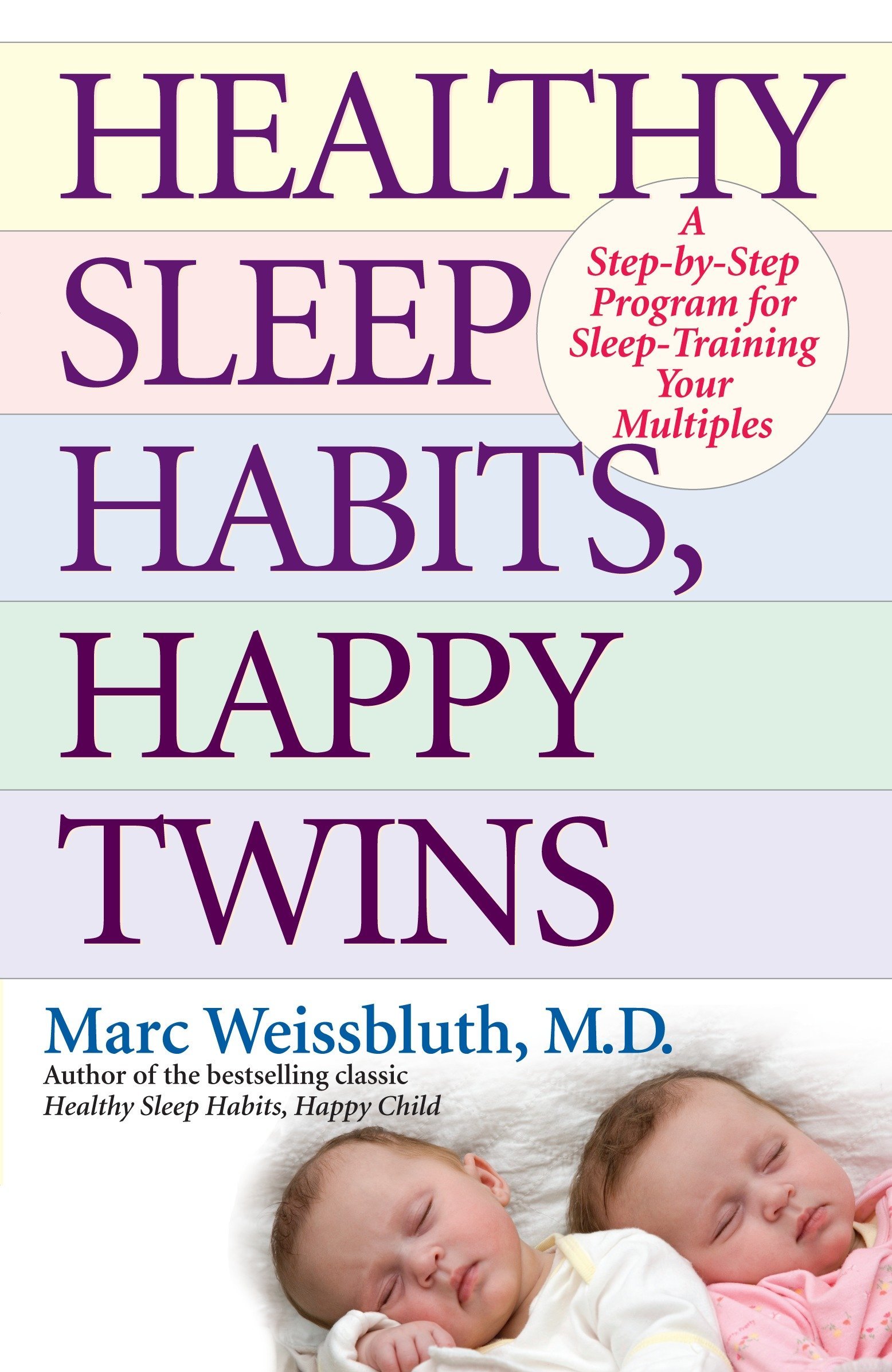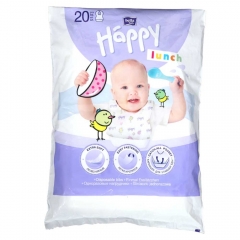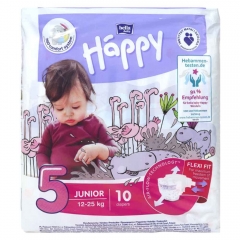-
 Thanh toán đa dạng, linh hoạtChuyển khoản ngân hàng, thanh toán tại nhà...
Thanh toán đa dạng, linh hoạtChuyển khoản ngân hàng, thanh toán tại nhà... -
 Miễn Phí vận chuyển 53 tỉnh thànhMiễn phí vận chuyển đối với đơn hàng trên 1 triệu
Miễn Phí vận chuyển 53 tỉnh thànhMiễn phí vận chuyển đối với đơn hàng trên 1 triệu -
 Yên Tâm mua sắmHoàn tiền trong vòng 7 ngày...
Yên Tâm mua sắmHoàn tiền trong vòng 7 ngày...
Healthy Sleep Habits, Happy Twins: A Step-by-Step Program for Sleep-Training Your Multiples
-

- Mã sản phẩm: 0345497791
- (436 nhận xét)

- Publisher:Ballantine Books; 17634th edition (June 9, 2009)
- Language:English
- Paperback:192 pages
- ISBN-10:0345497791
- ISBN-13:978-0345497796
- Item Weight:5.8 ounces
- Dimensions:5.1 x 0.5 x 8 inches
- Best Sellers Rank:#66,208 in Books (See Top 100 in Books) #4 in Twins & Multiples Parenting #36 in Sibling Relationships (Books) #243 in Baby & Toddler Parenting
- Customer Reviews:4.3 out of 5 stars 434Reviews

Mô tả sản phẩm
Product Description
From one of the nation’s most trusted experts on children’s bedtime and nap time comes a new guide for sleep-training twins so that everybody (including Mom and Dad) will be rested and happy!
As parents of twins and multiples know, double the fun can be double the sleep deprivation. Now, in Healthy Sleep Habits, Happy Twins, beloved pediatrician and renowned sleep authority Dr. Marc Weissbluth combines specialized advice for parents of twins with his tried-and-true sleep-training methods to show exhausted moms and dads how to get their babies to sleep on their own, stay asleep, and sleep regularly. This essential step-by-step guide to establishing good sleep patterns reveals how to build healthy habits in twins’ natural slumber cycles, including
• how healthy sleep differs from “junk” sleep, plus a helpful tutorial on the techniques of sleep training for new parents
• the five ingredients of healthy sleep, and why daytime sleep is different from nighttime sleep but equally important to good health
• why it’s crucial for babies to master the ability to fall asleep unassisted, without protest or crying, and how to help them do so
• essential tips for synchronizing your twins’ sleep schedules, plus information about how twins sleep best–when to keep them together, and when it’s time to separate them
• how to recognize early drowsy cues in your babies so you can catch the sleep wave before it turns into nervous energy that will keep them awake
Sleep-training twins presents a unique set of challenges. This invaluable guide will not only get your babies to sleep through the night but help you stay healthy and rested so you can enjoy the many blessings of having more than one!
Review
" I love Dr. Weissbluth' s philosophy that the most important thing to have is a well-rested family. And fortunately, thanks to this book, most days (and nights) we do!"
- from the Foreword by Cindy Crawford
"I love Dr. Weissbluth's philosophy that the most important thing to have is a well-rested family. And fortunately, thanks to this book, most days (and nights) we do!"
-from the Foreword by Cindy Crawford
From the Back Cover
One of the country's leading researchers updates his revolutionary approach to solving--and preventing--your children's sleep problems
Here Dr. Marc Weissbluth, a distinguished pediatrician and father of four, offers his groundbreaking program to ensure the best sleep for your child. In Healthy Sleep Habits, Happy Child, he explains with authority and reassurance his step-by-step regime for instituting beneficial habits within the framework of your child's natural sleep cycles. This valuable sourcebook contains brand new research that
- Pinpoints the way daytime sleep differs from night sleep and why both are important to your child
- Helps you cope with and stop the crybaby syndrome, nightmares, bedwetting, and more
- Analyzes ways to get your baby to fall asleep according to his internal clock--naturally
- Reveals the common mistakes parents make to get their children to sleep--including the inclination to rock and feed
- Explores the different sleep cycle needs for different temperaments--from quiet babies to hyperactive toddlers
- Emphasizes the significance of a nap schedule
-
Rest is vital to your child's health growth and development. Healthy Sleep Habits, Happy Child outlines proven strategies that ensure good, healthy sleep for every age. Advises parents dealing with teenagers and their unique sleep problems
"From the Trade Paperback edition.
About the Author
MARC WEISSBLUTH, M.D., a pediatrician with thirty-five years of experience, founded the original Sleep Disorders Center at Chicago’s Children’s Memorial Hospital and is a professor of clinical pediatrics at Northwestern University School of Medicine. He has lectured extensively to parent groups and has appeared on The Oprah Winfrey Show. Weissbluth lives in Chicago, Illinois.
Excerpt. © Reprinted by permission. All rights reserved.
Chapter One
The Importance of Sleep for the Whole Family
There’s nothing like a good night’s sleep to help us cope with the challenges of each new day. Most of us define “good sleep” as having to do with the duration and the depth of rest we get; it’s about both quantity and quality. There is actually more that goes into the definition of “good sleep,” and that is the subject of chapter 2. For the moment, I want to turn your attention more generally to why sleep matters so much.
The expression “sleep like a baby” refers to that deep, peaceful sleep that we observe in babies. But as parents of most infants know, it’s often the case that those charmingly serene little sleepers can pop awake and stay awake and can also have a terrible time getting to their needed slumber in the first place.
“Needed” is the operative word here; babies need quality sleep, and when they don’t get enough of it, everything is off, including their ability to get to sleep again. This might not make much immediate sense to you; many parents think that tiring a baby out over the course of a day will help him sleep better at night. Indeed, the single most common misconception is that babies will simply sleep when they are tired and if they are kept up longer, they will sleep better.
As we’ll discuss below, the opposite is true. Babies who are even a little overtired will have a more difficult time making up that lost sleep or napping on cue.
Skip ahead to Part II if you’re ready to get started learning to sleep-train right away, and look to chapter 5 for information about how much sleep is enough in twins of varying ages. But after all that, do come back to this discussion. Having a good understanding of how to get good sleep and what happens when children don’t will help you appreciate what your children are going through and may help you understand why they cry so hard when they don’t get enough rest.
A LITTLE TIRED IS LIKE A LITTLE SICK
Have you ever been a little sick or injured? Imagine that you have an ordinary cold with low- grade fever, sneezing, runny nose, headache, and a cough. After a few days the fever is gone, your nose is less stuffy, and the cough is less persistent. But you still feel a little weak and tired from having been sick for a few days. Even though you are ready to get back to your routine and your life, you feel uncomfortable and not at your personal best. Maybe you are a little less playful, less creative, less able to multitask. Maybe you’re a little more irritable as well. Being a little tired leaves you in the same predicament. If you’ve not had a good night’s sleep, you won’t be able to operate at 100 percent the next day. Each subsequent night of restlessness or interrupted sleep only compounds the problem. We get crankier and crankier; we may even start to have physical pain (headaches, body aches, and such).
So it goes for children as well. When babies and children don’t get enough sleep, they are not able to cope as well with what the day brings, and they are less able to take restorative naps during the day or fall into deep sleep quickly the following night. They may also have trouble staying focused on eating when you nurse or bottle- feed them. Of course, because they can’t communicate their distress any other way for the time being, they cry. All of this understandably makes parents stressed, but not everyone understands that lack of good sleep is the underlying problem.
We often attribute a baby’s crying and discomfort to gas, teething, or that dreaded but universal time of the day–the early evening–known to veteran parents as the “witching hour.” Other times we label our children “ high- spirited” or “needy,” but, actually, it’s usually impaired sleep that makes babies fussy, less adaptable, more intense, and more frightened in the first place. You might notice these changes more near the end of the day, when their sleep tank nears empty. Of course, everyone knows that when you are horribly sleep- deprived, you feel bad. But few people realize how even a little sleep loss impairs children’s mood and performance.
In our ever- busy lives as adults, sometimes sleep is the last thing on the to- do list. But to put it simply, sleep is not a luxury; it is a biological necessity. We should protect our own adult sleep so that we can think clearly in the short term and for the benefit of our long- term health. We need to nurture and protect our children’s sleep for both their present-day comfort and their long- term health as well. Helping your twins learn to soothe themselves, to fall asleep on their own, and to stay asleep for restorative periods of time is the key to making sure everyone in the family gets the sleep he or she needs!
Simply put: sleep is not a luxury; it is a biological necessity!
HOW SLEEP DEPRIVATION AFFECTS YOU My research with parents of twins confirms what I have observed as a pediatrician for more than thirty- five years: regardless of how old you are or what you went through to conceive your twins, or whether you have fraternal or identical twins, when they do not sleep well, the primary caregiver– usually Mom–suffers. Sleep deprivation undermines all aspects of her life and interferes with her ability to discover and execute solutions to help the twins sleep better. Ideally, you’ll want to talk about sleep solutions before the twins are born, but if you already have them and are already sleep- deprived, get Dad involved in figuring out the solution.
In addition to the lack of physical coordination, headaches, and even gastrointestinal issues that are associated with physical exhaustion, mental stress from sleep deprivation is likely to cause an increased heart rate, a rise in blood pressure, muscular tension, irritability, and depression. The physical and mental strain might resemble or trigger baby blues or postpartum depression and can create a severe strain on your marriage. One mother in my survey reported that because she and her husband were so tired, they began to fight, and, at the height of their sleep deprivation, they “hated each other at night.” Of course, we do not know whether exhaustion and stress from sleep deprivation mimics, worsens, or causes baby blues or postpartum depression. Maybe all three events can occur. What we do know is that sleep deprivation colors one’s outlook (the world looks like a darker, more lonely, and more difficult place to navigate), exacerbates relationship tensions, and makes life generally harder for everyone in the house.
- Mua astaxanthin uống có tốt không? Mua ở đâu? 29/10/2018
- Saffron (nhụy hoa nghệ tây) uống như thế nào cho hợp lý? 29/09/2018
- Saffron (nghệ tây) làm đẹp như thế nào? 28/09/2018
- Giải đáp những thắc mắc về viên uống sinh lý Fuji Sumo 14/09/2018
- Công dụng tuyệt vời từ tinh chất tỏi với sức khỏe 12/09/2018
- Mua collagen 82X chính hãng ở đâu? 26/07/2018
- NueGlow mua ở đâu giá chính hãng bao nhiêu? 04/07/2018
- Fucoidan Chính hãng Nhật Bản giá bao nhiêu? 18/05/2018
- Top 5 loại thuốc trị sẹo tốt nhất, hiệu quả với cả sẹo lâu năm 20/03/2018
- Footer chi tiết bài viết 09/03/2018
- Mã vạch không thể phân biệt hàng chính hãng hay hàng giả 10/05/2023
- Thuốc trắng da Ivory Caps chính hãng giá bao nhiêu? Mua ở đâu? 08/12/2022
- Nên thoa kem trắng da body vào lúc nào để đạt hiệu quả cao? 07/12/2022
- Tiêm trắng da toàn thân giá bao nhiêu? Có an toàn không? 06/12/2022
- Top 3 kem dưỡng trắng da được ưa chuộng nhất hiện nay 05/12/2022
- Uống vitamin C có trắng da không? Nên uống như thế nào? 03/12/2022
- [email protected]
- Hotline: 0909977247
- Hotline: 0908897041
- 8h - 17h Từ Thứ 2 - Thứ 7
Đăng ký nhận thông tin qua email để nhận được hàng triệu ưu đãi từ Muathuoctot.com
Tạp chí sức khỏe làm đẹp, Kem chống nắng nào tốt nhất hiện nay Thuoc giam can an toan hiện nay, thuoc collagen, thuoc Dong trung ha thao , thuoc giam can LIC, thuoc shark cartilage thuoc collagen youtheory dau ca omega 3 tot nhat, dong trung ha thao aloha cua my, kem tri seo hieu qua, C ollagen shiseido enriched, và collagen shiseido dạng viên , Collagen de happy ngăn chặn quá trình lão hóa, mua hang tren thuoc virility pills vp-rx tri roi loan cuong duong, vitamin e 400, dieu tri bang thuoc fucoidan, kem chống nhăn vùng mắt, dịch vụ giao hang nhanh nội thành, crest 3d white, fine pure collagen, nên mua collagen shiseido ở đâu, làm sáng mắt, dịch vụ cho thue kho lẻ tại tphcm, thực phẩm tăng cường sinh lý nam, thuoc prenatal bổ sung dinh dưỡng, kem đánh răng crest 3d white, hỗ trợ điều trị tim mạch, thuốc trắng da hiệu quả giúp phục hồi da. thuốc mọc tóc biotin























 KHUYẾN MÃI LỚN
KHUYẾN MÃI LỚN Hỗ Trợ Xương Khớp
Hỗ Trợ Xương Khớp Bổ Não & Tăng cường Trí Nhớ
Bổ Não & Tăng cường Trí Nhớ Bổ Sung Collagen & Làm Đẹp
Bổ Sung Collagen & Làm Đẹp Bổ Thận, Mát Gan & Giải Độc
Bổ Thận, Mát Gan & Giải Độc Chăm Sóc Sức khỏe Nam Giới
Chăm Sóc Sức khỏe Nam Giới Chăm Sóc Sức khỏe Nữ Giới
Chăm Sóc Sức khỏe Nữ Giới Chăm sóc Sức khỏe Trẻ Em
Chăm sóc Sức khỏe Trẻ Em Thực Phẩm Giảm Cân, Ăn Kiêng
Thực Phẩm Giảm Cân, Ăn Kiêng Bổ Sung Vitamin & Khoáng Chất
Bổ Sung Vitamin & Khoáng Chất Bổ Tim Mạch, Huyết Áp & Mỡ Máu
Bổ Tim Mạch, Huyết Áp & Mỡ Máu Bổ Mắt & Tăng cường Thị lực
Bổ Mắt & Tăng cường Thị lực Điều Trị Tai Mũi Họng
Điều Trị Tai Mũi Họng Sức Khỏe Hệ Tiêu hóa
Sức Khỏe Hệ Tiêu hóa Chăm Sóc Răng Miệng
Chăm Sóc Răng Miệng Chống Oxy Hóa & Tảo Biển.
Chống Oxy Hóa & Tảo Biển.